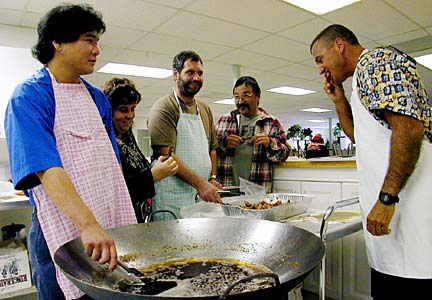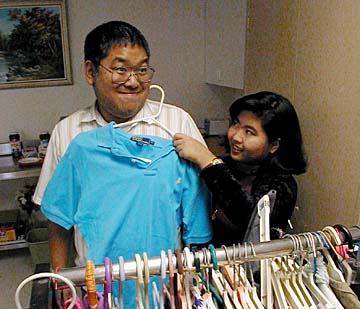Advertisement - Click to support our sponsors.


Mentally ill
making strides
at Clubhouse
The Koolau program
By Helen Altonn
now has its own site
Star-BulletinBryan Timeus can't say enough good things about the state's Clubhouse rehabilitation program for stable mentally ill people.
"A person who walks in and takes a tour might not notice anything, but these people's lives are uplifted," he said.
Timeus, 38, who takes medication for manic depression, is one of more than 120 members of the 3-year-old Koolau Clubhouse, which held an open house today at a new location behind Windward Mall on Alaloa Street.
It's the last of seven Clubhouses statewide -- six state-run and one independently operated -- to have its own site, said Michelle Stanley, director of the Oahu programs.
The unique program is designed to help mentally ill people gain work skills and jobs. During a "work-ordered" day, members do clerical, cooking and maintenance chores with the staff, as well as participate in vocational and work activities.
The Honolulu Clubhouse, which began operating in November 1998 in the old Blaisdell Hotel in the center of Hawaii Pacific University, encountered strong opposition from HPU and other neighbors.

"From our landlord's point of view, the biggest success is there hasn't been any big problem," Stanley said. "We continue to grow. We have a number of members out working in the community. We had a number of students come through doing a practicum at HPU and Honolulu Community College."The Honolulu Clubhouse has about 150 people on its rolls, although about 30 attend on an average day. It served about 200 people in the past year, she said. Statewide, she said, the Clubhouse program has assisted more than 800 people.
The Koolau Clubhouse moved in November from the Mental Health Center to a renovated building formerly occupied by the Salvation Army.
It has had a mixed reception at its new site in an industrial area, Stanley said. "Some business people felt they were losing business by us moving in. They just didn't understand people with mental illness. We have tried to do some education. It's an ongoing thing.
"One thing we focus on in the Clubhouse is being out in the community and not being dependent on psychiatrists or social workers, but more integrated in the community," Stanley said.
An innovative transitional employment program provides jobs for six-month periods at specific places for different members, said Virginia Jones, Koolau Clubhouse coordinator. If the member is unable to complete a shift, Clubhouse staff members do it at no cost to the employer, she said.
The Hawaii Clubhouse Coalition -- including facilities in Waipahu, Waianae, Kauai, the Big Island and Maui -- has just been recognized by the International Center for Clubhouse Development, Stanley said. The Honolulu, Koolau and Waipahu programs will be seeking international certification, she said.
Jones said there are 325 Clubhouses in more than 25 countries. About 40 of the Koolau Clubhouse members show up daily, she said. "It's the ultimate, the best psychosocial rehabilitation program," Jones said.
"I think this program is really influential in wellness," said Timeus, who has been going to the Koolau Clubhouse since October 1998. "There's a stigma attached to this illness. We have to constantly battle that. ... People think they understand mental illness, and they really don't."
Clubhouse members are able to congregate and make lasting bonds with friends, he said. "Without Clubhouses, people would have no place to go where they could relate and have total acceptance."
Timeus said the staff is limited and has to deal with budget cuts, "but they really enjoy their jobs." He works on a Koolau Clubhouse newsletter and does "whatever needs to be done" at the facility.
He has a political science degree from the University of Oregon and wants to return to college for a nursing degree, he said.
Timeus hopes to become a psychiatric nurse or social worker to help people with similar illnesses.
"We push empowerment and mutual respect," he said.
Clubhouses across the state recently shared 20 desktop computers donated by Hickam Air Force Base.
The Koolau facility also has partitions, desks and other furniture contributed by ADP Integrated Medical Solutions, Jones said.
"And it's beautiful. We look like a real office. We certainly don't look like a rehabilitation program," she said.
"We look normal, and that is the most exciting part of this: to look normal and be normal."